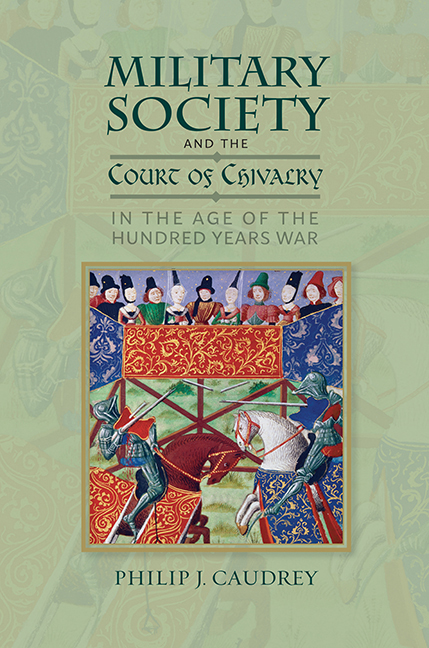Book contents
- Frontmatter
- Dedication
- Contents
- Acknowledgements
- Abbreviations
- Introduction
- 1 Military Service
- 2 Lordship
- 3 Region, Locality and Community
- 4 Soldiers, Civilians and Chivalric Memory
- Conclusion
- Appendix 1 Deponents’ Collective Military Records According to their Own Testimony
- Appendix 2 Lancastrian Retainers: Scrope & Hastings Defendants
- Appendix 3 Plaintiffs’ and Defendants’ Biographies
- Bibliography
- Index
- Warfare in History
3 - Region, Locality and Community
Published online by Cambridge University Press: 21 June 2019
- Frontmatter
- Dedication
- Contents
- Acknowledgements
- Abbreviations
- Introduction
- 1 Military Service
- 2 Lordship
- 3 Region, Locality and Community
- 4 Soldiers, Civilians and Chivalric Memory
- Conclusion
- Appendix 1 Deponents’ Collective Military Records According to their Own Testimony
- Appendix 2 Lancastrian Retainers: Scrope & Hastings Defendants
- Appendix 3 Plaintiffs’ and Defendants’ Biographies
- Bibliography
- Index
- Warfare in History
Summary
Historians of the Court of Chivalry – with an eye towards the bigger picture – have quite understandably tended to focus upon the wider significance of the surviving testimony, rather than upon the specific character of the cases themselves. Consequently, whilst Scrope v. Grosvenor, Lovel v. Morley and Grey v. Hastings have all broadly provided fascinating insights into the world of English war and society, the more straightforward question, of the relationship between the protagonists and their deponents, has been left largely unexplored. Only Sir Robert Grosvenor's witness list, piecing together the web of inter-gentry solidarities that prevailed in Cheshire and Lancashire, has been the subject of detailed scrutiny in this regard. This oversight is perhaps surprising, especially for Richard, Lord Scrope and Thomas, Lord Morley, who, like Grosvenor, brought to their cause large bodies of identifiable witnesses from various backgrounds to speak on their behalf, thereby making it possible for the historian to reconstruct how their witness lists were formed and what networks they utilised in their construction. This line of enquiry, moreover, ties in very neatly with the impressive body of scholarship – emanating from the groundbreaking research of K. B. McFarlane – that has sought to unravel, through case studies of individual regions, counties and localities, the everyday concerns, both public and private, of the English gentry. By addressing the testimony in these terms, focusing upon the horizontal and vertical ties of the protagonists with their witnesses, one may gauge the ways in which the types of gentry networks investigated in county histories came into play in the formation of Scrope's and Morley's witness lists.
In so doing, however, it must be borne in mind that both witness lists were constructed within the parameters set by the judges before the Court. No evidence survives of how Scrope or Morley selected their deponents, but the instructions they received from the judges about the types of evidence they should provide, as well as the order in which the interviews were conducted, have all been preserved in the Court's proceedings. To cite Scrope's case, which may stand for both, he demanded from the judges early in the case (February 1386) that they inform him, ‘in what manner he would be required to exhibit his right to the arms in question’.
- Type
- Chapter
- Information
- Publisher: Boydell & BrewerPrint publication year: 2019



